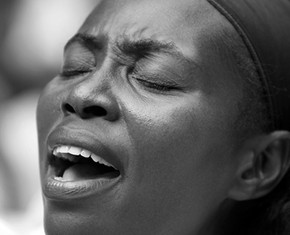The views expressed in our content reflect individual perspectives and do not represent the authoritative views of the Baha'i Faith.
Try to imagine it: your country, at war or in crisis, can no longer sustain you and your family. Your lives are in danger, and you realize you have to flee to survive. What do you do?
Within the past several years, 68.5 million people had to ask themselves this basic human question, and then leave their homes to save their lives.
That’s the current number, according to the United Nations High Commission on Refugees (UNHCR), of forcibly displaced people worldwide. It now amounts to almost one percent of the world’s total population—more than 44,000 people every day, one human being every two seconds, who had to flee their homes because of conflict, persecution or famine.
That number does not include the millions of so-called “economic migrants,” people who voluntarily leave their home villages, cities or countries seeking a better life.
Refugees from the war in Syria, from armed conflicts in sub-Saharan Africa, from gang violence in Central America, from religious persecution in Myanmar, from starvation in Darfur—these unfortunate victims all present the planet with an urgent new pressure point: the highest levels of human displacement ever recorded. This forced migration challenges the stability of entire countries, political dynasties and the global community itself.
More than half of those displaced people—52%—are children. If your children’s lives were threatened where you live, wouldn’t you leave your home?
Experts say that we haven’t seen the end of it, either. Multiple scientific reports predict a rising rate of refugees fleeing from mounting climate change, as sea level rise and hotter temperatures force people from their land and cause crop yields to fall or fail.
Many leaders have begun to speak out about this expanding crisis—but the world, as yet, has not come up with any reasonable, workable or comprehensive solutions. International relief organizations like the United Nations and large NGOs have been overwhelmed by the growing enormity of the problem. “The world’s system for protecting refugees,” says Amnesty International, “is broken.”
The Universal Declaration of Human Rights
Article 13.
(1) Everyone has the right to freedom of movement and residence within the borders of each state.
(2) Everyone has the right to leave any country, including his own, and to return to his country.
Article 14.
(1) Everyone has the right to seek and to enjoy in other countries asylum from persecution.
By settled international law, spelled out in the Universal Declaration of Human Rights, governments have a solemn legal duty to help all fleeing refugees and asylum seekers—but most developed nations fail to follow those laws, still treating refugees and asylum seekers as someone else’s problem. Closing their borders, refusing to grant asylum and building physical and economic barriers, those countries’ policies have forced an incredible 86% of the world’s refugees—mostly from Middle Eastern, African and South Asian nations—to stay in those developing regions, where few governments and organizations have the resources to help them. Just four countries now host the majority of the world’s refugees: Turkey, Pakistan, Uganda and Lebanon. Just one nation among the ten largest refugee destinations belongs to the developed Western family of countries: Germany.
This refugee and migration issue has recently risen to a frantic, polarizing boil in many economically-developed parts of the Western world. In the United States, Canada, all across Western and Eastern Europe and in Australia, refugee- and immigrant-related matters have generated enormous political controversy and upended conventional ways of thinking and governing. Observers have variously labelled this trend as nationalism, nativism, protectionism, isolationism, racism or simple fear-mongering. Ugly fights have erupted over the issue, and will likely continue.
Perhaps, then, it might be wise to take a step back from the ongoing political flashpoints around these contentious crises and review the moral and religious guidance we’ve received over time, to first orient ourselves to a higher and more spiritual point of view.
Let’s start with the wise advice of Judaism, from the Old Testament:
When a foreigner resides among you in your land, do not mistreat them. The foreigner residing among you must be treated as your native-born. Love them as yourself, for you were foreigners in Egypt. – Leviticus 19:33-34.
In the New Testament, Jesus gave his followers this loving counsel:
For I was hungry and you gave me something to eat, I was thirsty and you gave me something to drink, I was a stranger and you invited me in, I needed clothes and you clothed me, I was sick and you looked after me, I was in prison and you came to visit me. – Matthew 25:25-36.
The Qur’an kindly says:
They love those who emigrated to them and find not any desire in their hearts of what the emigrants were given, but rather give them preference over themselves, even though they are in privation. – Surat Al-Hashr 59:9.
The Baha’i teachings ask all human beings to help those who need our help:
Be very kind and serve every one; become lovers of justice and pray for the whole of mankind; help the poor and the children; heal the sick; shelter the refugees; and be known by your lives as the children of God; so may that sun become the light of the world, casting its radiance upon East and West. – Abdu’l-Baha, Star of the West, Volume 2, p. 8.
With this general guidance in mind, let’s take a fresh look at the world’s refugee crisis, and see if we can reevaluate it in light of the holy teachings of all the great Faiths. In this series of essays, we’ll review those teachings and see how we might possibly apply them to the current crisis—and we’ll explore the Baha’i Faith’s contemporary principles and proposed solutions to that crisis, as well.
















Comments
Sign in or create an account
Continue with Googleor